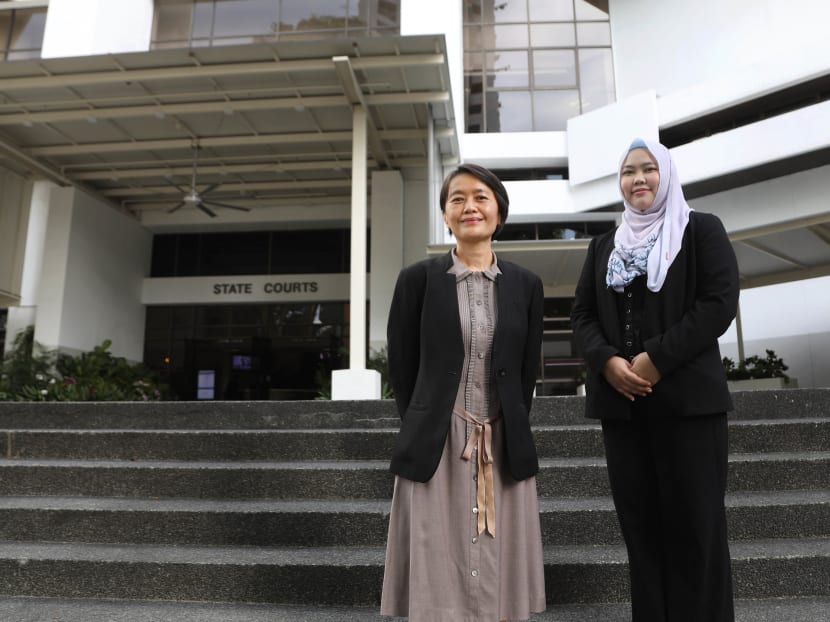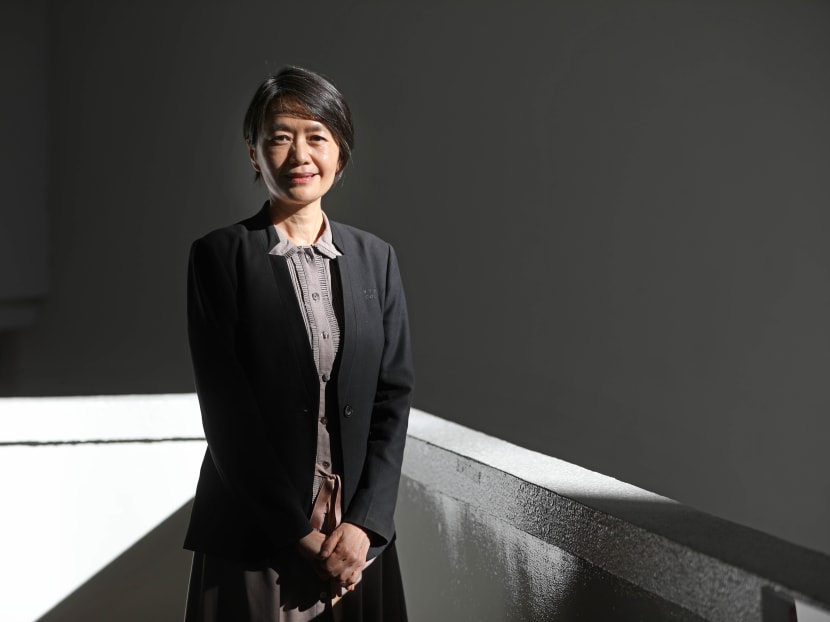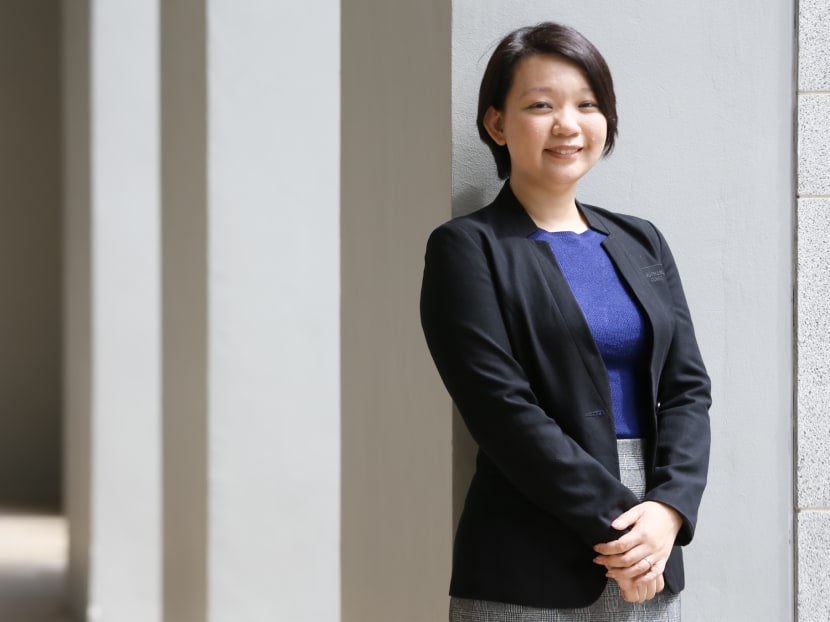‘Poker-faced’ but a human face: Court interpreters get desperate questions and more
SINGAPORE — They are at court hearings and get asked questions they cannot answer. They also have to keep a straight face when they run through graphic details of violence and abuse. For interpreters who work in the State Courts and Supreme Court, these can make up a part of their work day.

Ms Nurfadhilla Mohamed Kamarulzaman and Ms Betty Chew, who work as court interpreters, often get asked to provide legal advice but they say that is not what their job is about.
SINGAPORE — They are at court hearings and get asked questions they cannot answer.
They also have to keep a straight face when they run through graphic details of violence and abuse.
For interpreters who work in the State Courts and Supreme Court, these can make up a part of their work day. And every day is unpredictable, because they cannot prepare for the words that will come out of people’s mouths, which they then have to quickly interpret on the spot.
Stress? Quite likely. Boring? Never.
If being a good communicator is an act of charity, then the interpreters are serving in the frontline, only it is not always that they can help.
Ms Nurfadhilla Mohamed Kamarulzaman, 35, who has been on the job for seven years in the State Courts, said: “(The accused persons) will sometimes say, ‘I only have S$500 (for a fine), do you think it is enough?’ Other times, they would check with me what imprisonment term to ask for.
“I wouldn’t know these things. I also wouldn’t know how long a sentence the judge would impose.”

Ms Betty Chew, 53, who interprets in Chinese and Cantonese at the State Courts, used to be a homemaker and did ad-hoc translation work. She decided to return to full-time employment by being a court interpreter. Having worked for three years, she also noted that some people think interpreters “know everything about the law and they want to get some advice from us”.
However, interpreters are not legally trained and cannot dispense legal advice, she added.
A regular fixture in court proceedings, the interpreters provide services for court users who may not understand or speak English, which is the language of the courts.
The State Courts have 53 interpreters who can speak Malay, Mandarin and Tamil as well as Chinese dialects such as Cantonese, Hokkien and Teochew. The Supreme Court has 23.

Supreme Court interpreter Rageswari Suppiah, 47, said that the public may get the impression that their work is easy, but it is not.
“Interpreting is also about context. It is not just word-for-word translations. It is more than just translating one sentence to another language. You have to take into account context and nuance. One word can have many meanings in another language,” she told TODAY.
Ms Nurfadhilla said: “People think that we just talk. But we have to think on the spot… (think about) how to interpret what we just heard.
“Whatever the (accused person) is saying, you have to immediately, somehow, work it out in your brain and say, that is the word. You don’t know what this person is going to say.”
Apart from being able to think on one’s feet, an equally important skill, they added, is the ability to be objective and “not take sides”.

Ms Nurfadhilla remembered one of the first trials she attended. It was a child abuse case, and she had to interpret for both the victim and the accused.
Right after the young boy showed how he was abused, the accused person denied hitting him, and Ms Nurfadhilla had to interpret both accounts.
“I had to say it exactly as it was, even though I have my own personal reservations. You just have to have a poker face and interpret as accurately as possible,” she said.
In another child abuse case, she had to go through the autopsy reports of the deceased victim.
“That was the first time I had to see autopsy reports... I couldn’t sleep the whole night, because I kept thinking about the case… it was haunting me throughout,” she told TODAY.
“But of course, as interpreters, we have to remain calm and we cannot take sides.”
Before she worked as an interpreter, Ms Nurfadhilla was a journalist. Looking for a change of career but still wanting “to try something related to language that was not desk-bound”, she made the jump to the courts.
Ms Rageswari, who has 28 years of experience, found herself in this line partly because she grew up reading crime and mystery novels such as the Nancy Drew and Sherlock Holmes series. She also had a friend whose sister was working as a court interpreter and that opened her eyes to this area of work.
She joined the State Courts — known then as the Subordinate Courts — in 1990 as a student interpreter, before becoming a full-fledged interpreter two years later.

Another Supreme Court interpreter, Ms Leong Yuan Hong, 31, joined the profession eight years ago after graduating from her studies.
Ms Leong and the other interpreters told TODAY that as part of training, newcomers shadow senior interpreters at court sessions, undergo competency training to familiarise them with terms that might be used in court proceedings, and even attend mock court sessions and fireside chats with judges.
ADMISSION, CONFESSION
For many without legal background, getting legal terms right in another language can be daunting.
Ms Nurfadhilla gave an example of the words “confession” and “admission”.
“For us, when we interpret, they are almost the same, but there is a difference in legal meaning.
“So when the judges explain that to us, it is easier for us to then translate and explain it to the accused persons. We need to understand what is being said in court in order for us to interpret,” she said.
Ms Rageswari said: “If there is anything we do not understand, we can always clarify with the court.”
There have been occasions when the interpreters are scrutinised by lawyers and even by those whose testimonies they are interpreting, usually because what was interpreted is not what the person meant to say.
“These are challenging moments, but we have to be upright, and what we have stated is always recorded,” Ms Rageswari said.
Ms Chew agreed: “If I say something wrong, or if I interpret incorrectly, I will just have to admit it.”
In this digital age, while the Internet may provide online tools for translation, the presence of an interpreter is still vital.
Ms Chew said that technology “may not take into consideration cultural differences”, such as how Mandarin in Singapore is different from what is spoken in China.
Besides this, Ms Nurfadhilla said that in sensitive cases where there are vulnerable witnesses, it helps that these witnesses are able to see a human face and there is “a human touch”.
‘STRONG INTEREST’
Their work may be demanding, but the interpreters noticed that there is a “strong interest” from the younger generation to join their profession.
The Supreme Court has hosted visits by students from schools and universities that offer translation programmes, Ms Rajeswari said.
She noted, too, that recruitment advertisements regularly attract applicants keen on the job, regardless of age.
One major draw is that the work is never the same, the interpreters said.
"It is a different case every time," Ms Nurfadhilla said. "At one hearing, I might be interpreting scientific terms in a child abuse case. Then when I go to a civil case hearing, I might be handling industrial and financial terms.”
Job satisfaction, they said, comes not from handling major cases, but from being the one helping to facilitate the flow of information and allowing different parties to understand each other.
Ms Chew said: “The biggest satisfaction is when you are able to bridge the gap in communication, especially in a situation where (the court proceeding and judgement) will have a lifelong impact on the person who does not speak English.”
Ms Rageswari said: “You have to imagine that you are in a foreign country where no one speaks your language, and you don’t know their language. Suddenly, someone comes by and understands you, and helps you to translate — that’s like the role of an interpreter in the court process.”






